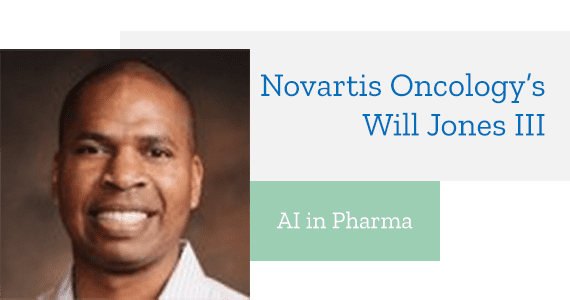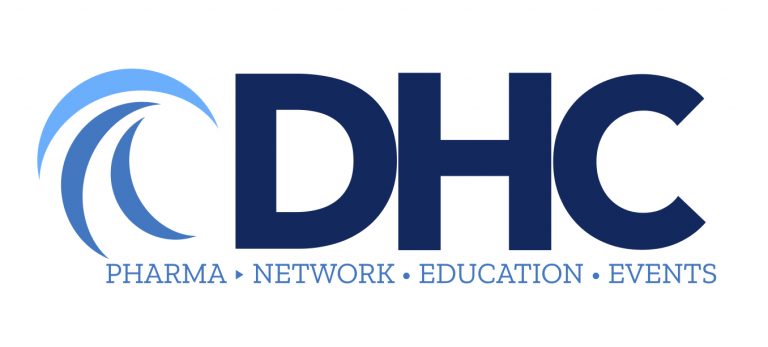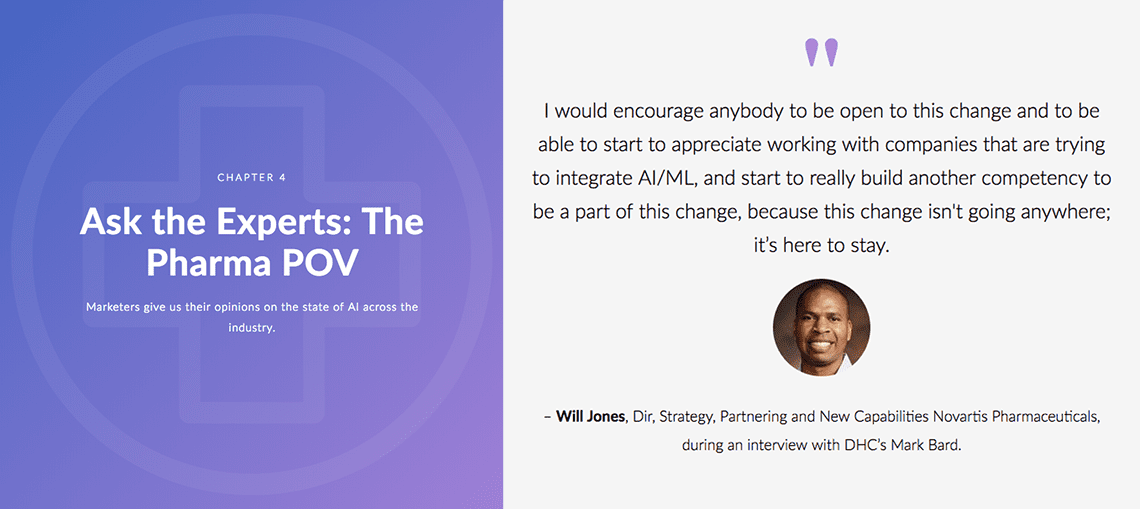
An Interview with Novartis Oncology’s Will Jones III – AI in Pharma – October 2018
Mark Bard: In recent years, a lot of the conversation about artificial intelligence and machine learning has been about how it will impact the pharmaceutical medical device industry specific to research and drug discovery – using an algorithm to go through a lot of data for drug screening. A key question for the marketing teams … how does AI apply to the commercial side of the house? Does it apply to the marketing?

Will Jones: The simple answer is yes … because when you think about the entire healthcare system, more than likely, most of the time, the pharma piece of the healthcare system – which is just one piece of the entire healthcare ecosystem – we’re the ones that are typically lagging behind when it comes to using technology to improve the experience of whatever output we’re trying to help the marketplace achieve or gain or have. Three-plus years ago when Novartis was first interested in trying to understand this better, we piloted some use cases, and the thing that we initially tried to understand is … could this new use of technology and way of looking at data, could it help us solve the business. The answer is yes.
The first thing you had to get right was – can we first bring the right people in the room? We learned that when we a brought cross-function team together in one place, the automatic answer was “wow,” AI/ML can be extraordinarily useful for the business because it brings people together who otherwise sometimes talk over each other or don’t even talk to each other at all. Another key thing we learned out of it was the ability to answer significant key business questions that typically have gone on for several business cycles without being able to be effectively answered. We now have a practical way to answer some of those key business questions, because no matter how many smart people we have in a company or on a team, no one can understand all the data as fast as they need to understand it.
MB: What are some of the other challenges within pharma when it comes to embracing AI and machine learning? It seems like a lot of the traditional methods of targeting seem to be working, right? What is the motivation or incentive to change?
WJ: In many ways, you are absolutely right because many of the things that pharma companies are doing today are actually good things. Pharma companies have found really extraordinary ways to use what they have fairly well.
Some of the current data sources that have always been in play are still good data sources, and they probably still solve anywhere from 60 to 80 percent of the questions we have in terms of better targeting, and better segmentation, and building better responses and messaging that we can use in promotional ways. Normal data still gets us a long way.
Where I think AI/ML really comes into play and where it really kind of just takes off and it leaves some of the practical datasets in its wake is the fact that AI/ML really allows you to bring a lot of data sources into one platform and start to look at data and get more insights and questions from what you thought were answers. You can bring more functions and teams together in a way that traditional data just can’t do. For example, in one AI/ML use case, we brought medical, marketing, finance, operations, market access, and HEOR/Outcomes in order to solve for key business questions for multiple brands. Bringing all these functions together allowed us to speak a common language; between all these teams coming together to solve the key business questions was the fact that AI was [is]
that common currency or language that we were
all using to kind of understand things we never could before.
So when we start to think about predictive triggers, biomarkers or lab tests that were very significant, these are significant not just for understanding the marketing plan or understanding first-line or second-line positioning. They’re also very important to understand if you are on the clinical/outcomes side because now some of the analysis done with AI//ML was allowing the business to find efficiencies, solve for deeper questions than before, and show us there were new ways to operationalize outputs between marketing and the field force.
Some of that same data analyzed by AI/ML was also confirming known answers to some business questions and, in some cases, answers were more robust and rich for every business function that was able to touch it. Of equal importance was the ability to have rich discussions with a lot of cross-functional teams; that really wasn’t happening all the time in a consistent way. That was a good byproduct of AI/ML.
MB: You mentioned earlier the explosion of data in oncology – exponential increases in data. Given we’ve seen the number of data sources increase – and the volume within those data sets increase rapidly – which data sources are important and why??
WJ: So I think how you get your head around this is that there’s still some limitations on the data that’s collected, just because it’s pharma; and so obviously, one of the biggest challenges at times of appreciating AI/ML and the data that it brings into the business is the fact that we still have a lot of data/privacy rules and standards that we have to meet so that we’re doing things correctly and safely, along with a standard of integrity and transparency the marketplace truly respects and appreciates. What AI/ML has allowed us to do beyond traditional data is to bring considerably more data together to be assessed – whether it’s wearable technologies, claims data, lab data, scans, EHR data, is you can look at a lot of data together and derive understanding from every particular touch point a patient has had with a physician(s).
All those different actual points within that patient journey become important because it allows us to appreciate what the patient is experiencing – pre-treatment/diagnosis to current-treatment/diagnosis to post treatment/diagnosis. How can that pharma company build the resources that support that patient journey? In pharma, we are striving to create resources, tools, and information that allow the patient to have similar experiences of the online functionality they experience in the other parts of their daily life. The patient/consumer perceives phenomenal ease of use in everything else they do, except for what it seems like in healthcare – we aim to recreate that same experience.
MB: Any advice for someone within pharma seeking to get a better understanding of how AI is changing the business and assessing the impact it will have on the industry? Any advice from your experience and what you’ve seen that works?
WJ: Yes, I think this might be the most important question. It seems like the pharma business – outside of all the other major sectors – has been slower to appreciate some of the dynamic that’s coming toward us that’s happening right now with AI/ML. I think we have to be even more open minded to being curious about innovation, especially AI/ML. Colleagues and peers that are open minded to this
seem to be creating a competitive advantage for learning and applying new ways of doing the business.
There is clear evidence that other sectors of business have embraced AI/ML and are starting to see changes to their business and the outcomes that AI/ML is helping to create. Our sector is just beginning this journey, and we should expect exciting achievements as we are beginning our journey leveraging AI/ML. I would encourage anybody to be open to this change and to be able to start to appreciate working with companies that are trying to integrate AI/ML, and start to really build another competency to be a part of this change, because this change isn’t going anywhere; it’s here to stay.
I think most everyone would agree, whether it’s a top-tier oncology company or a top-tier diabetes company, if something can help your teams address the business needs today more efficiently and then scale up what you’re trying to do in a competitive and economical way, and drive the business while delivering an exceptional patient experience – I think companies are open to that. That’s why I think AI/ML is here to stay.
You are seeing many companies with a chief digital officer as a function, or they are hiring for a chief data officer or VP/head of strategic data within organizations. How a company assesses, integrates, governs and strategically commercializes data moving forward is about building a new competitive advantage in the healthcare ecosystem. Governing, integrating, and scaling data across marketing and medical and clinical in efficient ways – this has not been done before, but this is now the future reality of pharma and the healthcare ecosystem. These are all new things that are happening within the last 12 to 24 months, and now pharma companies are trying to get them right.
I think the thing that is driving executive leadership to really embrace AI/ML are very practical things about data – data integration, storage, and governance. The fact that there’s so much data coming into organizations and it’s challenging to harness the potential of all of that data, except through some of these new and innovative ways that AI/ML can help harness. In the end, executives know that this is a significant undertaking. It’s extremely expensive, and it’s not a one-time cost. Human capital, executive vision, and leadership have to be willing to sponsor this long term.
 This interview featured in the Modern Pharma Marketing eBook, a joint publication launched with partner Intouch Solutions. You can also read the interview in context when you download a free copy of the eBook here.
This interview featured in the Modern Pharma Marketing eBook, a joint publication launched with partner Intouch Solutions. You can also read the interview in context when you download a free copy of the eBook here.
